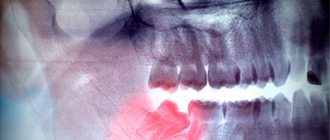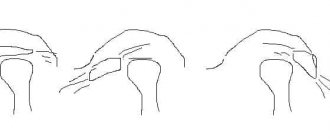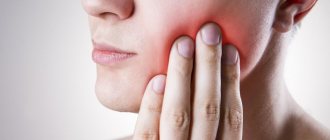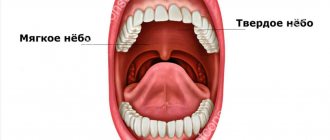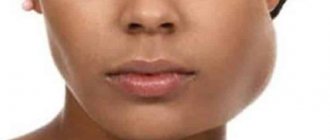Jaw pain near the ear: what causes the discomfort and how to cope with it
Jaw pain is an unpleasant symptom that causes significant discomfort. The problem requires immediate medical attention. When examining and making a diagnosis, he takes into account the location of the problem area. If your jaw hurts near your ear, this may indicate problems with the temporomandibular joint, which provides mobility to the lower jaw and its connection to the skull. Soreness in this area often indicates a number of other diseases. A specialist will help determine the cause.
Diagnosis of diseases
Even if the pain is mild at first, over time it can develop into exhaustion. Therefore, do not hesitate to visit a doctor. He will conduct an examination, collect anamnesis, prescribe x-rays and tests. For heart problems, an ECG is additionally performed. If a tumor is suspected, the examination will be more serious, since it is necessary to determine what kind of tumor (benign or malignant), the stage of the lesion, and the presence of metastases.
Taking painkillers can “blur” the clinical picture, so you should not use them without a doctor’s prescription, especially before diagnosis. Only with a correct diagnosis will the doctor be able to determine what to do to eliminate the pathology.
Why does the jaw hurt near the ear: the main causative factors
Soreness in the jaw with radiation to the ear can provoke various pathologies.
Dental problems
Dental diseases are often accompanied by pain, which can radiate to different parts of the head, including the area near the ear. Possible reasons for the appearance of an unpleasant symptom:
- caries at different stages of development, pulpitis;
- abscess;
- damage to prostheses - crowns or implants;
- glossitis - inflammation of the tongue;
- cyst or granuloma of the tooth root;
- gum disease – gingivitis, periodontitis;
- periostitis is an inflammatory process in the periosteum.
Pain in the jaw is often associated with procedures performed by the dentist, for example, teeth cleaning or whitening, their treatment or removal, implantation, or installation of braces. Irradiation into the ear is observed when the figure eight erupts and its position is incorrect.
A problem such as bruxism can also provoke pain. When it is present, the jaw muscles unconsciously contract, causing severe teeth clenching and friction. A characteristic grinding sound occurs. Often a person is not aware of the presence of bruxism, since it usually occurs at night. A disorder can be suspected by the presence of discomfort in the facial muscles in the morning. Due to the strong tension, pain is also felt in the jaw, and microcracks form on the enamel.
Disorders of the temporomandibular joint
TMJ problems are the most common cause of non-dental pain in the facial area. Joint dysfunction is provoked by various disorders in the mobility of the system of muscles, ligaments, cartilage and bones. Pain may appear on the left or right, as well as on both sides. The main symptoms of TMJ dysfunction:
- pain near the ear when swallowing, chewing, yawning, talking;
- dizziness;
- visual impairment;
- noise in ears;
- headache.
The disease is also diagnosed by a characteristic click when opening the mouth. TMJ injuries (dislocations, fractures) are accompanied by bruising, swelling, and redness. You can get them from a blow or bruise. Often the jaw disc is displaced forward, and the head of the lower jaw is shifted backward. This provokes stretching of the anterior and posterior disc ligaments and pressure on the bilaminar area of the joint, where pain receptors are located.
The TMJ can be affected by arthritis and arthrosis. In the first case, severe night pain, crunching and clicking, and stiffness in the morning appear. In the second, the pain is aching and chronic in nature and increases with yawning and opening the mouth. Pathology is provoked by various reasons: age-related changes, stress, inflammation, trauma and genetic predisposition.
Disturbances in the functioning of the TMJ are observed with the habit of clenching or moving the jaw, with bruxism, and constant chewing of gum (the joint does not have time to rest after eating food). Causes wear and tear and malocclusion. Chewing food on one side provokes increased pressure in this area. Over time, damage to the TMJ affects the nerve endings, which explains why pain occurs.
Neurological diseases and vascular pathologies
Trigeminal neuralgia is a disease that causes sharp pain in different parts of the face. It all depends on which branch is affected (there are three of them). Unpleasant symptoms may intensify when chewing, talking, pressing on the face, or brushing teeth. In addition to the trigeminal nerve, pain near the ear can provoke damage to other nerves:
- wandering;
- glossopharyngeal;
- occipital
Arteritis, in which acute pain appears due to muscle spasms, can provoke malaise. Deformation is visually observed, and compaction is visible on the x-ray. Characteristic symptoms include swelling and redness of the affected area. Pain in the jaw, which radiates to the ear area and other areas of the face, may indicate diseases of the brain, in particular, circulatory disorders of this organ.
Painful sensations near the ear can be the result of damage to blood vessels, for example, the carotid artery. In this case, the neck, jaw and facial part are affected.
Oncological factor
As cancer develops, pain often appears on the right side. The tumor can be malignant or benign. In the first case, the nerve endings first lose sensitivity, and numbness of the face appears. After this there is pain in the jaw. In the second case, unpleasant sensations in this area are also observed. A lump appears near or behind the ear - a consequence of the growth of a lymph node. In this case, it is important to take measures to prevent an inflammatory or purulent process from starting. In addition to pain near the ear, other symptoms associated with a benign tumor include:
- deterioration of general condition;
- increased body temperature;
- headache;
- redness of the tumor.
If suppuration occurs, this already poses a danger to the patient’s life. Lack of proper care can lead to infection entering the bloodstream.
Reason: wisdom teeth
Wisdom teeth, or “eights,” are the outermost teeth in the jaw row. They cut their teeth between the ages of 16 and 25, when the replacement of permanent teeth has already ended. Not all people have “Eights” - some do not have them or are not present in full.
Why does it hurt to open your mouth?
The intensity of pain depends on the characteristics of tooth eruption and the individual pain threshold.
In this case, it's all about the location of the wisdom teeth.
They are located on the edge of the jaw arch in the cheekbone area, the distance between them and the temporomandibular joint is minimal.
In addition, the rudiments of the “eights” are usually located in the gum deeper than the others, so their eruption is much more painful than the appearance of other teeth, causing swelling of the gum mucosa, which can spread to the soft tissues around the joint.
Nature of pain and accompanying symptoms
The pain in such situations is constant, it intensifies when you try to open your mouth completely, while talking, chewing, and it hurts to yawn.
The intensity of the pain depends on the characteristics of tooth eruption and the individual pain threshold - from mild discomfort to serious pain that prevents you from falling asleep.
In addition, the gums swell, the submandibular lymph nodes enlarge, and the temperature may rise. In some cases, the mouth practically does not open.
How to relieve the condition
To relieve pain, you can use medications - Kamistad, Kalgel ointments. To relieve inflammation and swelling, the oral cavity is rinsed with solutions of antiseptics, painkillers and medicinal herbs.
A cold compress may also improve the condition. It is acceptable to take painkillers. If noticeable improvement cannot be achieved within 3-4 days, you need to go to the dentist.
Possible complications
If an unpleasant symptom occurs, you should immediately contact your dentist. You should not postpone your visit, since the problem itself will not disappear, but may only get worse. Only a specialist can tell you what to do. In order to make an accurate diagnosis, a computed tomography scan is prescribed. If the doctor excludes the presence of dental problems, the patient will be referred to another specialist (neurologist, oncologist, phlebologist, etc.). Lack of help for muscle tension can lead to the following problems:
- the appearance of back pain;
- dizziness;
- sleep disorders;
- blurred vision, pain in the eyes;
- increased sensitivity to light;
- depressive state.
If the discomfort is accompanied by congestion in the ear, there is a risk of partially or completely losing hearing. When the jaw does not open completely, it shifts. It becomes painful to chew. After some time, problems with teeth arise, enamel wears off, and sensitivity increases.
Inflammation
The inflammatory process (furuncle, osteomyelitis, abscess, phlegmon, etc.) on the skin of the lower jaw, oral mucosa, soft tissues of the cheek can involve the joint and masticatory muscles. Such conditions require urgent intervention.
Causes of pain
Impaired mouth opening is associated with the involvement of the joint, muscles or nerves that allow the mouth to open. Another reason is that when moving in the joint, the position of the inflamed tissues changes.
The nature of the sensations and accompanying symptoms
The pain is constant, sharp, twitching. Associated symptoms include fever, swelling of the face on the affected side, enlarged lymph nodes under the jaw and on the neck, and decreased jaw mobility.
If there is inflammation under the skin, the skin becomes hot and thins. A boil on the face (more common in men) is clearly visible.
Treatment methods
Purulent inflammatory processes are treated surgically. The doctor opens the affected area, washes it with antibiotics, and leaves a drainage to drain the pus. The patient is prescribed a course of antibiotics, regular dressings, and washing of the postoperative wound with antiseptic solutions.
How to eliminate jaw pain near the ear
Identifying the causative factor allows you to determine how to treat the pathology. Possible actions of the doctor:
- Dental problems require sanitation, which eliminates any sources of infection.
- For bruises, use cold compresses. A dislocation requires a visit to a surgeon who will realign the jaw. For fractures with bone displacement, surgery is performed. The patient is prescribed painkillers and anti-inflammatory external agents.
- In case of an abscess, the abscess is opened and antibiotics are prescribed.
- Oncology involves the use of surgical techniques, radiation and chemotherapy.
- Infectious and inflammatory processes are stopped with the help of antibiotics, compresses, and mouth rinses. Sometimes surgical treatment is required.
Also, depending on the provoking factors, different methods of physiotherapy are used: microwave, UHF, ultraviolet irradiation, diadynamic therapy.
Vascular damage
Pathological processes in the vessels can lead to disruption of the blood supply to the jaw joint. In this case, the patient not only experiences pain when opening the mouth, but also experiences disturbances in its mobility.
Cause of pain
Pain occurs due to impaired blood supply to the muscles of the lower jaw, as well as due to inflammatory processes in the vessels themselves
Pain occurs due to impaired blood supply to the muscles of the lower jaw, as well as due to inflammatory processes in the vessels themselves.
Nature of pain and accompanying symptoms
The pain can be burning (arteritis), pulling, pressing, squeezing.
It can spread not only to the joint and jaw, but also to neighboring areas - the ear, the wings of the nose, the cheek. Concomitant symptoms include impaired mouth opening.
Treatment methods
Depends on the specific pathology of the vessel. Various therapeutic measures can be carried out - the use of anti-inflammatory drugs, painkillers, and, if necessary, surgery on the vessels of the lower jaw.
Other Possible Causes
In addition to those listed above, there are other reasons that can cause pain in the jaw and when opening the mouth.
These diseases are not related to the jaw apparatus:
| Disease | Cause of pain | Associated symptoms | Treatment |
| Tetanus | Nerve damage | Cramps, opisthotonus, muscle pain throughout the body | Antibacterial therapy, hyperbaric oxygenation |
| Carotidydynia | Carotid artery lesion | Facial pain, headaches that occur in attacks | Individual |
| Red ear syndrome | Impaired blood supply - dilation of blood vessels in the ear area | Pain in the ear, jaw, teeth, half of the face. Redness of the ear | Individual. In rare cases, surgery |
| Disorders of calcium and phosphorus metabolism | Pathologies of bone structure, osteoporosis | Bone pain, deformed or brittle bones, muscle twitching and weakness | Calcium and phosphorus preparations, enzyme agents to improve absorption |
| Angina | Irradiation of pain from the tonsils, or swelling of the tonsils | Redness of the throat, enlarged tonsils, cough, painful to swallow | Antibiotics, anti-inflammatory drugs |
| Otitis | Radiation of pain | Ear pain and congestion, hearing loss | Antibiotics, anti-inflammatory drugs, antiseptic ear drops |
